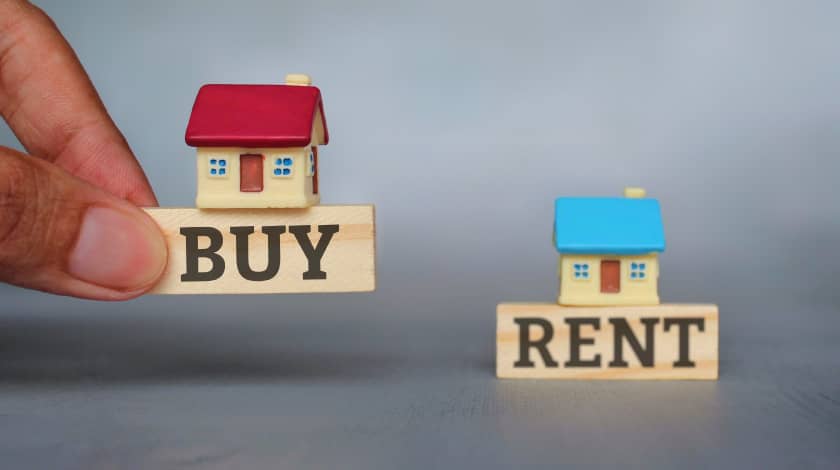To Rent or To Buy a Home: What’s Best for You?

Moving to a new place is an exciting journey that comes with plenty of decisions. One of the biggest choices you’ll have to make is whether to rent or buy a home. This guide for movers aims to make that decision easier by highlighting the essential factors to consider. So, whether you’re a first-time mover or a seasoned wanderer, buckle up as we delve into the world of renting versus buying.
Why Is This Decision Important?
First and foremost, the decision to rent or buy a home is a significant one because it impacts your finances and lifestyle. Renting might offer flexibility, while buying can be an investment in your future. It's crucial to weigh the pros and cons of both to determine what suits your goals and circumstances.
Also read: Things to Check during Home Inspection
The Financial Aspect
Renting: The Low-Commitment Choice
- Initial Costs: Renting usually involves lower upfront costs compared to buying. You might have to pay the first month's rent and a security deposit, but that's generally it. The rental guide will provide all the necessary answers related to house rentals.
- Predictable Expenses: When you rent, your monthly expenses are pretty predictable. Rent and utilities are usually your primary concerns. You don't have to worry about maintenance costs or property taxes.
- Flexibility: Renting offers more flexibility. If your job or lifestyle requires frequent moves, renting makes it easier to pack up and go.
Buying: The Long-Term Investment
- Equity Building: When you buy a home, your monthly mortgage payments contribute to building equity in the property. This can be an effective way to build wealth over time.
- Tax Benefits: Depending on your country's tax laws, you might be able to deduct mortgage interest and property taxes from your income taxes.
- Potential for Appreciation: If the property value increases over time, your home can be a lucrative investment.
- Upfront Costs and Maintenance: Buying a home generally requires a down payment, closing costs, and ongoing maintenance expenses. It’s essential to have a financial cushion to handle these costs.
Lifestyle Considerations
Renting: The Freedom Seeker’s Path
- Less Responsibility: As a renter, you won't be responsible for maintenance or repairs. If the furnace breaks or the roof leaks, it’s the landlord’s responsibility.
- Easier Relocation: If you fancy a change of scenery or find a new job in a different city, it’s much simpler to end a lease than to sell a property.
Buying: The Community Builder’s Dream
- Stability and Community: When you buy a home, you’re likely to stay there for a longer period. This can foster a sense of community and belonging, which is great for families.
- Customization: As a homeowner, you can make your space truly yours by remodeling, decorating, and landscaping without needing a landlord’s permission.
Repairs and Maintenance: The Hidden Costs
For Renters
As a renter, maintenance is generally less of a concern as the landlord handles most issues. However, it's essential to read your lease agreement carefully. Sometimes, renters may be responsible for minor repairs or maintenance. Also, consider the responsiveness of your landlord or property management company in dealing with maintenance issues.
For Buyers
Homeownership comes with the responsibility of repairs and maintenance. These costs can add up. Before buying, get a home inspection to understand the property's condition and anticipate potential repair costs. Budget for regular maintenance and have an emergency fund for unexpected repairs.
Special Considerations
Rent Control
In some areas, rental prices may be subject to rent control laws. This can be a significant benefit for renters, as it limits how much the rent can be increased annually. Understanding the rental laws could helpful.
Homeowners Association (HOA) Fees
If you are considering buying a property in a community with a Homeowners Association, be aware of the HOA fees. These fees are in addition to your mortgage and can change over time. Understand what the fees cover and if the rules and regulations of the HOA align with your lifestyle.
Insurance
Renters should consider renters’ insurance to protect their belongings, while buyers will need to obtain homeowners’ insurance. Insurance costs can vary based on location, especially in areas prone to natural disasters.
Changing Family Needs
Think about the future. If you’re planning to expand your family or might need to accommodate aging relatives, buying a home that can grow with your needs could be beneficial. Conversely, if you anticipate a change that would favor a smaller living space, renting might be more appropriate.
Property Value: A Key Player in Home Purchase
When considering buying a home, it’s important to assess the property’s value, both current and potential future value. Research the neighborhood’s historical price trends and local development plans, as these can influence property values. Also, consider the quality of schools, availability of public transportation, and nearby amenities, which can affect both your quality of life and the property’s resale value.
Market Conditions and Location
It’s also vital to consider the housing market conditions and location when deciding between renting and buying. In some areas, it might be cheaper to buy a home, while in others, renting might be more economical. Research the local housing market, and consider consulting with a real estate agent to gain insights.
Also read: Guide to settle in a new city
Conclusion
Renting vs. buying: A guide for movers would be incomplete without emphasizing the importance of personal circumstances. Reflect on your financial situation, lifestyle preferences, and future goals. Don’t rush into a decision; take your time, consult professionals, and weigh the pros and cons. Ultimately, the best choice is the one that aligns with your needs and aspirations.
Remember, the perfect home is not just about the building; it’s about building the life you want. Whether that’s through renting or buying, make the decision that’s right for you.